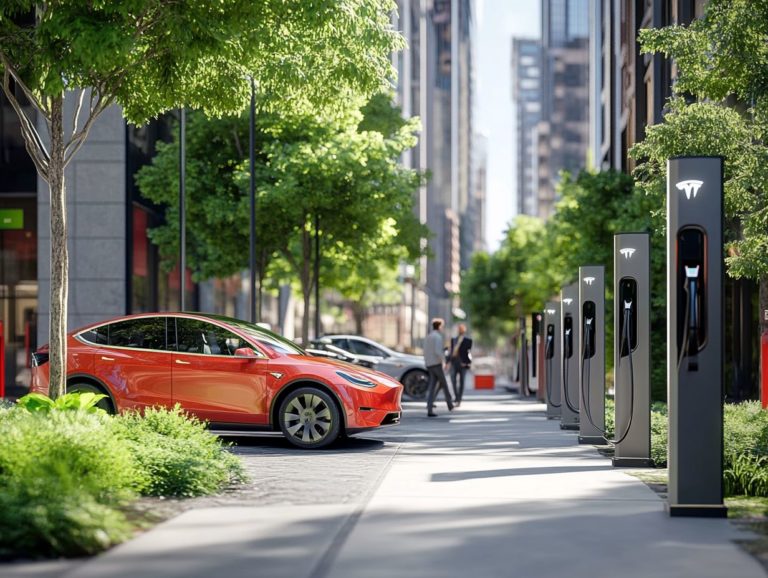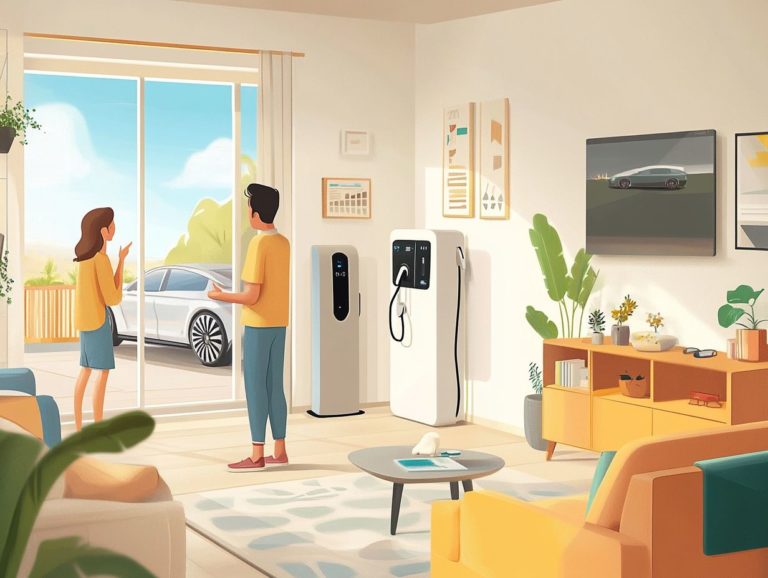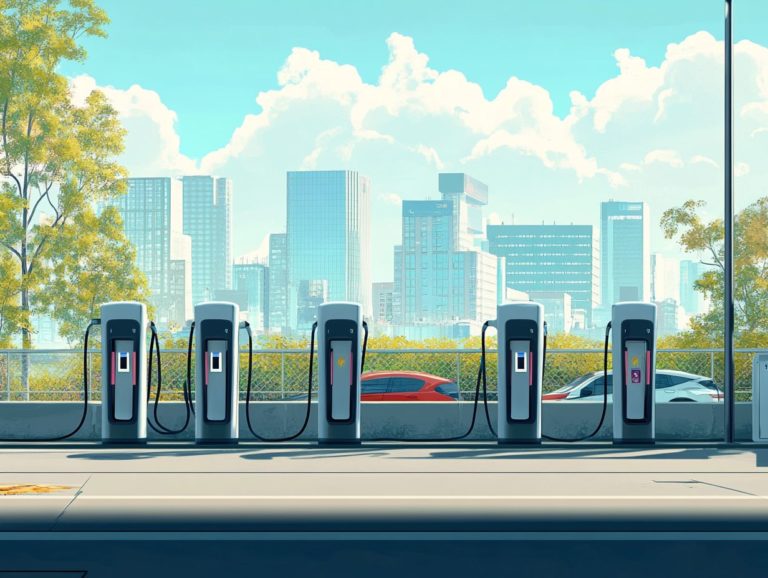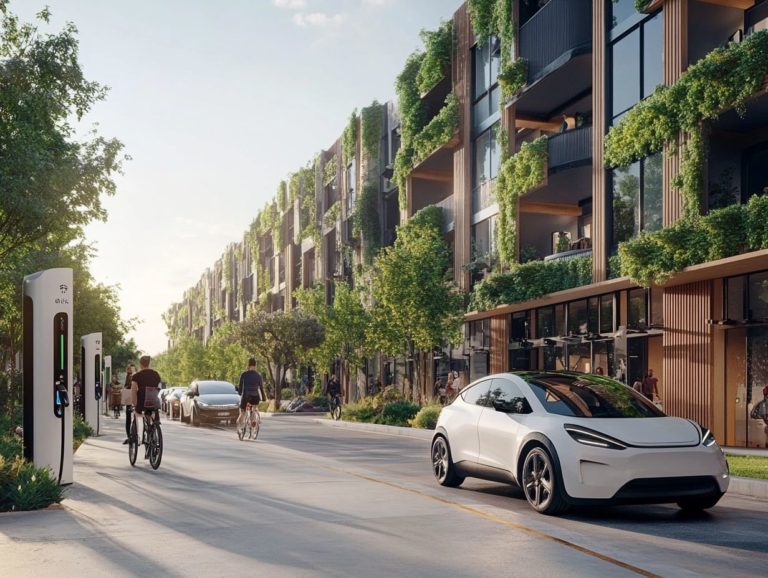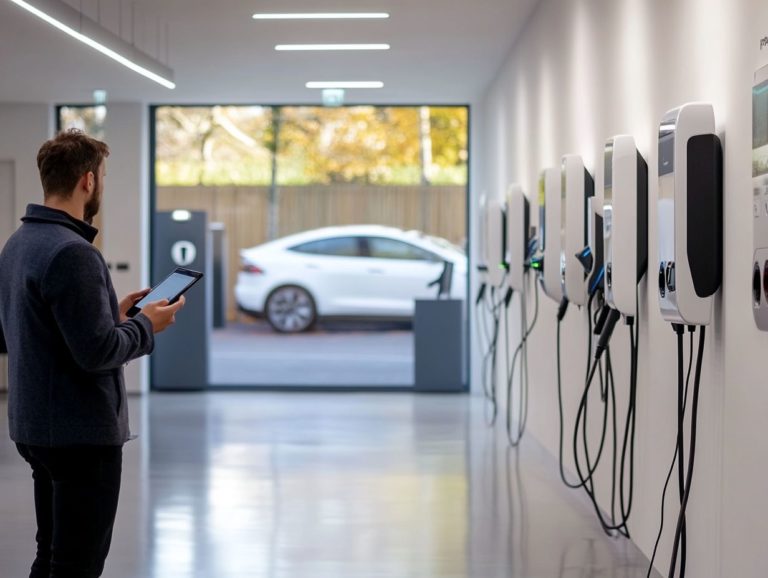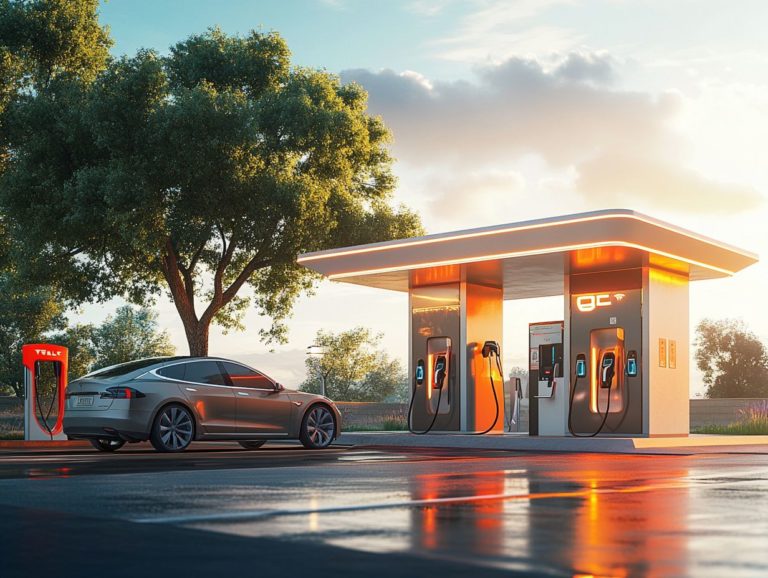What You Need to Know About EV Charging Standards
As electric vehicles (EVs) gain momentum, understanding EV charging standards becomes essential. This article delves into the various types of standards in place, highlighting their importance for manufacturers and consumers alike.
Discover the benefits of standardized charging solutions. They enhance efficiency and convenience for EV owners like you.
Examine the challenges and controversies surrounding these standards. Differing opinions and potential resolutions will be discussed.
Get ready to explore the exciting future of EV charging standards! You’ll learn about upcoming trends and developments that could shape the landscape.
Contents
Key Takeaways:
- Standardized EV charging ensures efficiency and convenience for EV owners, with various types of standards available globally.
- Disagreements surrounding EV charging standards highlight the need for further development and potential solutions in the future.
- Predictions and developments in EV charging standards show a promising future for the widespread adoption of electric vehicles.
What are EV Charging Standards?
EV charging standards are essential frameworks that dictate how electric vehicles (EVs) interact with charging infrastructure. They ensure compatibility and safety across various charging networks.
These standards cover different charging protocols and guidelines, allowing manufacturers to create vehicles that seamlessly connect with diverse charging equipment. As the electric vehicle market grows, grasping these standards becomes crucial for consumers and industry stakeholders.
Key protocols you should know include CCS (Combined Charging System), NACS (North American Charging Standard), and OCPP (Open Charge Point Protocol). Each plays a vital role in enhancing your user experience. For instance, CCS and NACS promote efficient charging speeds and broad compatibility, enabling you to use a network of charging stations without connector mismatches. OCPP enhances infrastructure management and data exchange, ensuring timely updates and services.
Together, these standards create a cohesive and accessible charging ecosystem. This allows you, as an EV owner, to travel confidently, knowing you can easily find and use charging stations nationwide.
Types of EV Charging Standards
The realm of EV charging operates under a variety of standards, each crafted to support specific protocols and ensure the seamless functioning of electric vehicle service equipment (EVSE). CCS and NACS standards have gained widespread acceptance, while CHAdeMO maintains appeal in certain regions.
The advancement of protocols like ISO 15118 introduces sophisticated features, such as plug-and-charge capabilities, enhancing the charging experience and promoting interoperability.
Overview of Different Standards
Different EV charging standards cater to specific needs, enhancing compatibility between vehicles and charging stations. CCS and NACS focus on rapid charging, while CHAdeMO stands out for its bi-directional charging capabilities. OCPP streamlines communication between charging stations and management systems, ensuring precise energy management and monitoring.
The evolution of these standards responds to the growing demand for electric vehicles, fueled by environmental concerns that ignite innovation in sustainable transportation. CCS emerged to meet the need for faster charging solutions, enabling vehicles to recharge up to 80% in less than 30 minutes.
CHAdeMO’s bi-directional capability allows cars to draw power and return energy to the grid. Meanwhile, OCPP helps future-proof charging networks and enhance user experiences through real-time data, scheduling, and remote diagnostics.
If you’re considering an electric vehicle, understanding charging standards is crucial! These evolving protocols lay the foundation for a more efficient and user-friendly charging infrastructure, connecting new technologies with the everyday experience of electric vehicle ownership.
Benefits of Standardized EV Charging
Standardized EV charging provides a wealth of advantages for both electric vehicle owners and operators. It significantly enhances the overall charging experience while fostering a strong, interoperable charging infrastructure. By adopting common protocols—like those established by the Open Charge Alliance—you gain access to a broader array of charging points with confidence in compatibility.
Standardized charging solutions streamline energy management. They offer you smarter charging options that optimize speed and efficiency across diverse public charging networks.
Efficiency and Convenience for EV Owners
As an EV owner, the efficiency and convenience brought by standardized charging systems revolutionize your charging experience. It becomes easier to locate and utilize charging points across various networks.
With standardized protocols, you enjoy seamless interoperability, allowing you to charge your vehicle at numerous public stations without compatibility headaches. This makes electric vehicles practical for everyday use, encouraging more consumers like you to embrace electric mobility solutions.
Recent advancements in charging technology have elevated this landscape. Innovative fast-charging solutions allow you to replenish your battery in a fraction of the time compared to traditional methods.
The expansion of ultra-fast charging stations provides a comprehensive range of options tailored to meet the growing demands of electric vehicle users. Urban areas are now integrating charging stations in convenient spots, such as parking lots and shopping centers, significantly reducing wait times and making electric vehicle ownership even more appealing.
These developments enhance your confidence in the practicality of electric vehicles, ultimately accelerating adoption rates among consumers like you.
Challenges and Controversies Surrounding EV Charging Standards
Despite impressive strides in EV charging standards, the industry grapples with challenges and controversies that hinder interoperability and the growth of charging infrastructure.
Disagreements among automotive manufacturers about which standards to embrace can result in fragmentation. This leaves consumers perplexed and potentially limits their charging options.
The ongoing battle between established standards like CHAdeMO and new protocols like CCS adds complexity, raising questions about the future of rapid charging solutions.
Disagreements and Potential Solutions
Disagreements among stakeholders in the EV charging ecosystem often center on competing charging protocols. This inhibits interoperability and stifles the effectiveness of public charging networks. These conflicts highlight the need for collaborative solutions that promote harmonization of charging standards.
By fostering partnerships among automotive manufacturers, charging network operators, and regulatory bodies, the industry can work towards unified charging solutions that benefit everyone involved.
Note the debate between CHAdeMO and CCS. This isn’t just about technical choices; it reflects regional needs complicating market acceptance. To address these disagreements, there is a need to establish best practices for standardized connectors and charging protocols.
Successful collaborations, such as joint initiatives by major automakers to install compatible charging stations, provide a blueprint for creating a more user-friendly landscape. By sharing insights and resources, stakeholders can develop solutions that enhance the efficiency and accessibility of public charging networks, paving the way for widespread EV adoption.
Future of EV Charging Standards
The future of EV charging standards is set for dramatic change. This shift is driven by new technologies and a growing need for efficient solutions in electric vehicle charging.
The industry is embracing smart charging capabilities. These advancements will simplify charging processes and improve power output and speeds.
Predictions and Developments
In the coming years, expect exciting changes in EV charging. Look for improved interoperability and charging infrastructure, which will reduce wait times and boost convenience.
Faster charging technologies, such as ultra-rapid chargers, will enhance your experience by minimizing downtime on long journeys. Car manufacturers will play a key role, integrating new technologies into their vehicles while collaborating with energy providers to optimize grid efficiency.
Such collaborations could lead to dynamic pricing models and decentralized energy solutions. These not only optimize your energy consumption but also promote sustainability.
Frequently Asked Questions
Have questions about EV charging standards?
EV charging standards are guidelines that ensure electric vehicles and charging stations can work together safely. They allow for effective communication, making charging efficient and secure.
Why are EV charging standards important?
These standards promote interoperability between different charging stations and vehicles. They ensure safety during the charging process and help prevent damage to vehicles or equipment.
Which organizations set EV charging standards?
Several organizations, including the International Electrotechnical Commission (IEC), the International Organization for Standardization (ISO), the Society of Automotive Engineers (SAE), and the International Energy Agency (IEA), set EV charging standards.
What are the different types of EV charging standards?
The main types are AC charging, common at home, DC charging for faster charging, and wireless charging, which uses electromagnetic fields to transfer energy to vehicles.
Are EV charging standards the same worldwide?
No, EV charging standards vary by region. Europe primarily uses Type 2 AC charging, while the US uses the SAE J1772 standard. However, efforts are underway to standardize protocols globally to promote interoperability.
Can I use any EV charging station with my electric vehicle?
You can use any charging station, but check your vehicle’s compatibility with its port.

.jpg_00.jpeg)
.jpg_01.jpeg)
.jpg_10.jpeg)
.jpg_11.jpeg)
